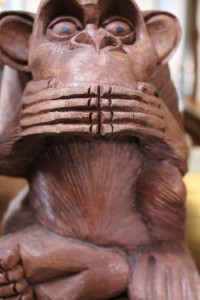Written by Dawn Rutan
Before Christmas I heard a couple sermons that made references to the wilderness in Scripture, and those thoughts have continued to stick with me. There are several times when individuals or groups go through wilderness experiences in the Bible. Interestingly, many of these refer to the same general region in the Middle East. Contrary to our perceptions, the wilderness is not necessarily a bad place. Consider these experiences:
- Hagar goes out into the wilderness after Sarai casts her out of the house (Genesis 16). In the wilderness, God speaks to her, reassures her of His presence, and promises that her offspring will be multiplied. Her response is “You are a God of seeing. Truly here I have seen Him who looks after me.”
- Moses spends 40 years in the wilderness in training (Exodus 3). He encounters a burning bush and is commissioned to free the Israelites from Egypt. He has an extended conversation with God and he is reminded that God will work out all the details. All Moses has to do is obey.
- The Israelites spend 40 years in the wilderness as a result of their sin and failure to believe God (Numbers 14). While it was bad news for the generation that died in the wilderness, the next generation grew up learning to trust God to provide for them and to obey Him. They were in training both physically and spiritually during that time.
- David escapes into the wilderness when King Saul is seeking to kill him (1 Samuel 20). Though David starts out alone, it isn’t long before he has gathered a group of faithful men around him. While they waited for the day when David would be crowned king, they lived, worked, and worshiped together. Many of David’s psalms were written in the wilderness and they reflect his trust in God’s steadfast love.
- Elijah fled to the wilderness in fear of Jezebel (1 Kings 19). Elijah was ready to give up and die, but God has other plans for him. God provides food and drink for him, and then he gets to experience the presence of the Lord. God tells him there is work yet to be done, and reassures him that he is not alone. Elisha will soon be appointed to replace Elijah.
- John the Baptist was “a voice of one calling in the wilderness” (Matthew 3). John was a prophet in his own right, but he knew that his role was to point people to Jesus. Though crowds came out to see him, he did not become proud or lose his focus. I wonder if perhaps he experienced the “wilderness” more when he was thrown in prison? It was there that he began to doubt and Jesus sent word to remind him of the truth of who He was.
- Jesus was led by the Spirit into the wilderness for 40 days of prayer and fasting (Matthew 4). In the midst of His time in the wilderness, the devil came to tempt Jesus to abandon God’s plan by doing things a different way. But Jesus was single-minded in His purpose to obey God. Jesus successful in resisting every temptation so that He would be the perfect substitute for us on the cross. It was for the joy set before Him that He could endure.
- Paul also spent time in the wilderness before embarking on his teaching mission (Galatians 1). Though we don’t know exactly what Paul did in the wilderness or how long he was there, it seems likely that he was learning to listen to God. He was already learned in the Scriptures, but he had to change his thinking when he found out that Jesus was the Messiah. It was probably wise for him to step out of the spotlight as a killer of Christians before suddenly preaching the very word he had hated. He caused enough dissension as it was.
Wilderness experiences can be valuable times in our lives—times of physical training, talking to God, listening to God’s plans, being reassured of God’s presence and provision, learning obedience, and learning the truths of Scripture. The wilderness may look different for each of us—in the desert, in prison, in our homes, in sorrow and loss, in times of persecution or conflict, in times of hardship, etc. Sometimes we may not even realize we’re in the wilderness at first.
Our temptation is to get out of the wilderness as quickly as possible. We don’t want to endure difficult circumstances. The wilderness seems like a barren, unproductive place to dwell. We may tend to picture it as the Sahara desert, when in reality there are all kinds of provisions available to us. We may not see it, but we are never alone in our wilderness. Not only is God present and watching over us, but He has provided a community in the form of the Body of Christ.
This may be a good time to meditate on the wilderness experiences in the Bible. If we can remember what others have learned in the wilderness, we can be encouraged to seek God when we come to our own wilderness. Instead of looking for a way out, look for what God has to teach you. As usual, I’m preaching at myself here. Perhaps I’m a slow learner, but at least I haven’t been in the same place for 40 years yet!



